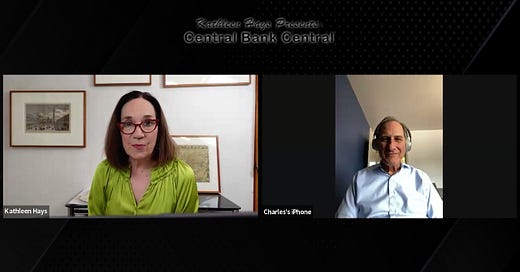Charles Calomiris has taken on the gamut of challenges in the world of finance and banking for decades. He is a critical thinker who has made his mark researching and writing about some of the biggest issues in finance and economics. He has also been a passionate practitioner who has advised government entities at the U.S. Treasury’s Office of Financial Research and served as the chief econonmist the Office of the CComptroller of the Currency, the OCC, among many such roles.
Now Charlie has dived into the cryptocurrency world but not so much into the retail world of Bitcoin and its myriad cousins. He is focused on stablecoins, and passionate about the role they can and will play in the traditional world of money and banking where he sees them pushing aside traditional tools like checking deposits for example and opening the door to a safer, faster, cheaper world of crypto-dominated tools.
So dive in and hear what Charlie has to say. If you are cryptocurrency neophyte like so many of us you will find him clear, informative and convincing like any good professor should be. If you are a practicioner, a user of all things crypto-based, whether you agree or disagree with him, you will enjoy hearing what he has to say.
Crypto Banking 00:01:11:11
When I was at the OCC back in 2020 and 2021, working for Brian Brooks, who was a really interesting person, the acting comptroller, who was a lawyer who had a lot of history and and since then has been even further involved in crypto. That was the reason I went there, just because Brian called me up and said, you know, let's modernize the financial system. Let's bring the future a little closer and a little faster. What was really important to Brian Brooks at that time and to me was trying to figure out what part of this new crypto world made sense to bring into the banking system. And so Brian convinced me that we had a lot of good work to do in crypto and part of that was figuring out what could be chartered.
What belongs in banking? 00:02:10:14
What is it that's going on in that chartered official banking system that should connect with crypto? And Brian was really the pioneer of that. And one part of that was Stablecoins Stablecoins are extremely exciting, although they sound very boring because they're so stable, but they're extremely exciting because they offer the possibility of an alternative to our clunky 19th century payment system that we have in the U.S. that instead of waiting forever for things to clear and worrying about hacking
I’ll have settlement with my latte please… 00:02:50:06
In fact, the Fed wire system, all this backward 19th century clearing technology. Let me just give you a dream. Imagine this. You take your iPhone to the store, you buy a cup of coffee, and you have gross real time settlement at the speed of light, which means the money that's sitting in your account somewhere pays for that coffee and the payment goes through immediately.
Something new 00:03:20:16
Now, this is very different from the kinds of things that you might be used to, like, you know, Zelle or PayPal or those kinds of things, because they're still working through this clunky old 19th century payment system and they're really just sitting on top of the plumbing of the existing banks. We're talking about something completely different. Okay. I mean, it's independent of the banks, of the existing banks that's independent of the federal Reserve System, and that offers a huge amount of benefit to consumers.
Something Obsolete 00:04:44:
Is it already outmoded? Well, yes. I mean, the whole idea of a centralized payment system is so vulnerable to begin with. And then it's so delayed in getting access to your money when you clear through the centralized payment system, because it has to go through this whole network. Yeah, it's completely outdated already. And, you know, there was a paper by some friends of mine at the New York Federal Reserve Bank who've already written a paper called A Pre Mortem of the hacking of a Fed Wire.
Blockchain and crypto 00:05:48:10
let's talk about blockchain before we talk about Stablecoins because because blockchain is kind of the general thing that makes crypto crypto. Okay, so let's go to blockchain because I remember when Bitcoin first came out and when crypto was first coming out, a lot of people said, This is going to be the real benefit of it and everybody's going to benefit from using blockchain. I don't know if everybody has used its technology, it's what you know that much. Maybe we'll start with blockchain, but I also want to get a little Bitcoin in there before we get to Studio one, because that's what most people think of now who have not been involved, haven't purchased and many people say they never will. They just don't trust it. They don't think it's going to have long term value. They're wrong.
Blockchain is a ledger 00:06:26:06
They're going to use it. If they live even a few more years, they'll be use. They're probably so. So blockchain is just a ledger. Think of any kind of paper ledger that you have something that keeps list off track of a particular sequence or series of things that occur that's occurring as a communication or bilateral communication that that that saves all of those actions. And that what makes it so attractive is that it was really a revolution in cryptography. It was really a revolution in being able to encrypt your messages so that they were virtually unhackable. And that's still true, right? So what? So blockchain is just basically a ledger that keeps track of things that are very secure, okay? And that happened bilaterally.
Safety through compartmentalization 00:07:23:20
And so the real exciting thing about it is that because it's secure and bilateral, even if by some miracle somebody could hack into your particular exchange with me in, in some blockchain transaction, it wouldn't give them access to the rest of the network. So it's extremely secure to have blockchain. Now, you asked about Bitcoin. Well, Bitcoin lives in the blockchain.
Bitcoin example some pluses and minuses 00:07:51:10
It's just one particular application and not a particularly wonderful one from the standpoint of the future. It was just the first and so it was the one that that gets a lot of attention. Bitcoin is very useful if you want to send something to someone. So for example, suppose that I had some relatives in Venezuela and that because of all the problems in trying to connect with people in Venezuela, I just said, Look, I'll get on the Internet, buy some Bitcoin Bitcoin, and then I'll transfer it to you and you will then be able to get cash. You'll sell the Bitcoin, I'll buy the Bitcoin somehow, find a way to transfer that to you. You'll sell the Bitcoin and that will be the most efficient way for me to get cash to you. Think of it as a remittance. And so in some situations that's true. But here's the downside of bitcoin. It doesn't have any particular backing. Its value just comes from the fact that it started off as a kind of first mover to be able to accomplish something unique like this transfer. And that gave it a basis of value that then created a use case for it. But Bitcoin, if you've noticed, is extremely volatile. I mean, because it's no longer the only game in town and because it's not the most efficient game. So it's going to go to zero eventually. You wouldn't put any of your money like you wouldn't put $5,000 that you would normally hold in a checking account into Bitcoin because it could turn into $1,000 tomorrow or it could turn into $10,000. And that's not the way we behave when we put money into our checking accounts or something like that, or money market fund accounts. We want it to preserve its value. We want it to be stable.
Surprise! Stablecoin is stable! 00:10:22:15
Stablecoin is actually linked to the dollar, if I'm not mistaken, gold. It's a blockchain based, I'd call it an asset, a blockchain based asset. You own the coin and it's transacting on the blockchain, as we described earlier. And the key thing you're getting from it is it's stability. Now the different stablecoins can achieve that stability in different ways. And so we should talk about that as a separate topic. But let's first just define it through one means or another. It's stable in value so that it it is going to be worth tomorrow pretty much what it's worth today. And that's generally almost 100% of it is is dollar denominated. So if you buy, let's say, a Tether, which accounts currently for 90% roughly of the stablecoin, So Tether is a stablecoin.
Tether 00:11:42:23
It's a stablecoin. If you buy it, who owns it? Who started? I mean, is that that's that owned by that company? I think Tether is the name of the company. Okay. Okay. So let's call it I forget what the four initials are that most people refer to it with. It might be U.S., DC or something like that, but so Tether is a dollar denominated stablecoin issued by a private company. It's not based in the United States even. It's not a great sort of model of a great business plan. I'm not a big fan of Tether, nor or most people I know, but because it was the first mover, it still preserves a lot of the market share. It still has it. And then so what you get from holding the stablecoin is a very convenient way to transact in other crypto assets. So if you want to buy Etherium or you want to buy Bitcoin, not only can you do it, but you can do it in a variety of different ways
Why Crypto? Why Tether? 00:13:49:15
You know that it's going to be worth dollar for dollar. You don't know for sure, but assuming it's credible that it's being managed credibly, the reason that you own tether is not to make a profit from some speculation, but to have a convenient medium of exchange that you can use to buy things in the crypto universe. So this is like having a bank checking account, but obviously it's different. I don't have a stable coin account myself at the moment, so I'm going to be getting one soon. But I don't have one. But you don't really you don't think of its current use. As for things other than crypto assets, most people don't think of it that way, although I believe that it can be used that way because you can currently hook it up to your telephone and then you could just as you use PayPal or other things, you could use a an account of tether and you draw down that account into dollars and use it to pay for things in dollars from your phone.
The Crypto Advantage 00:15:37:03
I believe that that's currently available. I know it will be commonly used going forward. You know, currently the main use for tether or circle and there are other stablecoins too. Currently it's mainly for crypto assets, but that's going to change because once it becomes something people can use and realize they can use for retail transactions in general from their phone, that then it's going to be something that people will want. Why will you want it, Kathleen? Very simple. You're going to want it. You're going to want it because you're it's going to allow you to do things faster. I don't know if you've ever had the effect, the feeling of wanting to complete a transaction where the bank didn't give you access to your money. That happens quite a lot.
… and earn more interest 00:16:28:06
So imagine being able first you'll be able to use whatever money you have quickly without worrying about delays of access it. Secondly, you'll be able to earn much higher interest. So this is generally speaking, you're going to have these assets backed by Treasury bills. And if you look, you'll see that your your checking account deposits, even your savings account deposits typically earn less than the comparable maturity Treasury bills on the savings deposit.
..and permit some information transfer that is private 00:19:30:16
What's great about blockchain is because it's a it's a it's a ledger, a communication between two people, the information that communication can be done credibly with a third party verification, but it can also be done privately. So I can say I can communicate my age to you and no one else needs to know it. And I can do that at the speed of light alongside my order for a certain transaction to occur. I can also use that message to make my transaction contingent so I could say, as Daryl Duffy talked about at our conference, that whoever I could make the transaction B I'm going to give you some dollars if you're giving me some euro and I send a message that says, please give this to this person or I'm willing to do that.
A dream? 00:21:31:24
So it's it's sort of like a dream, right? Anyone on planet Earth I can communicate with securely at the speed of light. Any information I want to through this this device. That's very, very useful.
Charles William Calomiris (born November 8, 1957) is an American financial policy expert, author, and co-director of the Institute for Research in Economics in Washington, D.C. Previously, he was a professor at Columbia Business School, where he was the Henry Kaufman Professor of Financial Institutions and the Director of Columbia Business School Program for Financial Studies,[1] and was director of the Center for Politics, Economics and History at UATX.[2]
Born in Washington, D.C., his father was businessman William Calomiris, who was also born in Washington, D.C., to Greek immigrant parents and grew up in the Capitol Hill neighborhood.[3] William Calomiris was a former president of the Washington Board of Trade and founder of the William Calomiris Investment Corp, which led efforts to create housing for low-income and middle-income Washington residents.[3] In addition, he was a banker who served as director of both Lincoln National Bank and Jefferson Federal Savings & Loan, and also as an advisory director of Riggs National Bank. He also had been board chairman of the Washington Federal Savings Bank before its 1996 sale to First Maryland Bancorp.[3] William Calomiris died in 2000, when he was 80 years old.[3]
Charles Calomiris received a B.A. in economics from Yale University and a Ph.D. in economics from Stanford University.[1][4][5] Calomiris thereafter served in numerous capacities with organizations addressing economic policy, including serving as a Fellow at the Manhattan Institute for Policy Research, a member of the Shadow Open Market Committee, co-director of the Hoover Institution's Program on Regulation and the Rule of Law, and a Research Associate of the National Bureau of Economic Research.[1][4] He has advised government entities as a researcher at the Office of Financial Research in the United States Department of the Treasury,[1] and as a member of the International Financial Institution Advisory Commission of the United States Congress.[4]
Calomiris was critical from the outset of the Dodd–Frank Wall Street Reform and Consumer Protection Act, a set of financial regulations passed in response to the 2007-2008 financial crisis. Argued that the law doubles down on "too big to fail" and does not prevent the government from subsidizing mortgage risk, which fueled the crisis.[6][7] He further cited the law's overly complicated and ambiguously worded provisions, and instead advocated alternative "incentive-robust" solutions, such as "a rule requiring that banks hold cash at the central bank equal to 20% of their assets", and "a minimum uninsured debt requirement for large banks in the form of subordinated debt".[7]
In 2014, Calomiris coauthored, with Stephen Haber, Fragile By Design: The Political Origins of Banking Panics and Scarce Credit.[11][12] [7] In the book, Calomiris and Haber argue that the problems faced by the banking industry arise from the extensive network of government regulations effectively directing how they do business, including that "geographic restrictions on banking made banks too small to weather regional economic shocks".[13] The book received various accolades, including an American Publishers 2015 Award for best book in Business, Finance and Management, and being named to best books of the year lists by the Financial Times and Bloomberg Businessweek.[4]













Share this post